-
About
- About Listly
- Community & Support
- Howto
- Chrome Extension
- Bookmarklet
- WordPress Plugin
- Listly Premium
- Privacy
- Terms
- DMCA Copyright
- © 2010-2025 Boomy Labs


 Niina Niskanen
Niina Niskanen
Listly by Niina Niskanen
Here are some of my favourite European mermaid legends. Please add your favourites to the list so we can discover more and don't forget to vote for your favourites!
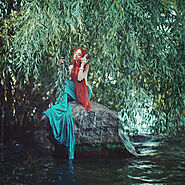
In Welsh folktales, mermaids are known as Annwn. These beautiful creatures live in underwater villages at the bottoms of certain magical lakes. Unlike conventional mermaids, Annwyn often lacks "fishy" features and looks more like regular humans. They swim in the water and can be even seen walking weightlessly on the surface and sailing on golden boats. They are known to take human lovers but these relationships never last.
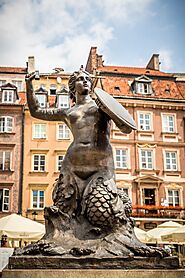
Warsaw mermaid is the protector of Warsaw, the capital of Poland. Her bronze statue graces the Old Town Market Square and she decorates Warsaw's coat of arms. Various legends surround the mermaid. In a popular tale, a mermaid named Sawa swam from Gdansk to Vistula River and stopped to rest in Warsaw and she liked the place so much she decided to stay. She was trapped by a greedy merchant but a fisherman named Wars helped her to escape. The city's name comes from the merger of Wars and Sawa.
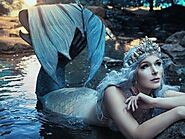
In a Cornish legend, a lovely maiden becomes enthralled with a young man from Zennor called Matthew Trewella. Matthew had a beautiful singing voice and the maiden never missed an opportunity to hear him sing in church. Matthew was attracted to the woman and one day followed her to the sea, and never returned. Years later, a ship lay an anchor near Zennor and a mermaid came to ask them to lift the anchor for it lay on the roof of her underwater home, where she was living with Matthew Trewella.
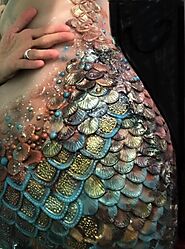
The story of Melusine comes from Middle Ages. After accidentally causing his friend's death count Raymond was walking in the woods in an agitated state of mind. There he came across a beautiful woman. Melusine. He asked her to marry him. Melusine had one condition. He was not allowed to see her bathing on Saturdays. One night curiosity won and to his horror, Raymond saw that his wife had a lower body of a snake. He became angry and Melusine left. According to legend she now haunts the French woods.
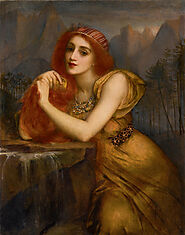
A beautiful young woman named Lorelei was abandoned by her lover. Men in the town found her irresistible. The bishop sentenced her to be sent away to a convent. On their way there Lorelei asked if she could see the river one last time. She climbed to the high cliff overlooking the river and threw herself into the water, where she transformed into a nixie, a mermaid. Ever since then Lorelei has been told to haunt a rock that carries her name.
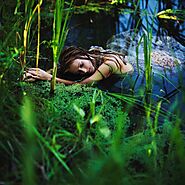
Legends from Eastern Europe tell stories about the Rusalka. Rusalka appears as a demonic creature. Even as a succubus. Rusalka is always a female. Some describe being fishy-woman hybrids, akin to mermaids. They are freshwater beings, and usually, live at the bottom of the rivers. They can be spotted sitting near the lakes or rivers where they live, combing their long hair. At night they sometimes shed their fish tales and climb trees and sing with a beautiful voice.
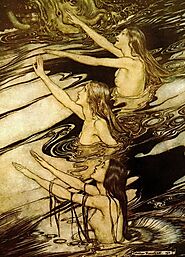
In the rivers and lakes of Germany and Poland lives shapeshifting spirits known as Nixes. They look perfectly human when on land, but they have qualities that regular humans don't. They can live and breathe underwater. Both males and females can adopt human forms and come on land when they please. Nixes entice human beings to their aquatic domains to drown them.
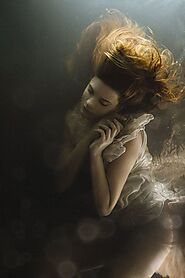
The name of Vellamo comes from the verb "velloa" which means movement of water. Vellamo is the Finnish goddess of the sea. Unlike most mermaids, Finnish mermaids usually don't have tails and they look more like humans. Vellamo wears a dress that is made of sea foam. She is married to Ahti the god of the sea. Back in the day, Vellamo was a particularly popular goddess among sailors and fishermen. Find out more about Finnish mermaid deities here.
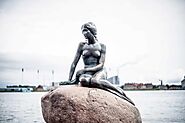
The best-known tourist attraction of the city of Copenhagen in Denmark, is of course Den Lille Havfrue, the little mermaid, based on a story written by Hans Christian Andersen. In the fairytale little mermaid wants to live on land and falls in love with a human prince. A story that many believe, was based on Andersen's own life, and his unrequited love for his male friend. More mermaid stories here.

The term "Siren" has become synonymous with the term "mermaid". Originally sirens did not look like mermaids. They were half-women half-bird. In Greek mythology, sirens were daughters of river god Achelous and they have such beautiful voices that seafarers were hypnotized by them ´- and either smashed their ships to rocks or jumped overboard and drowned.
